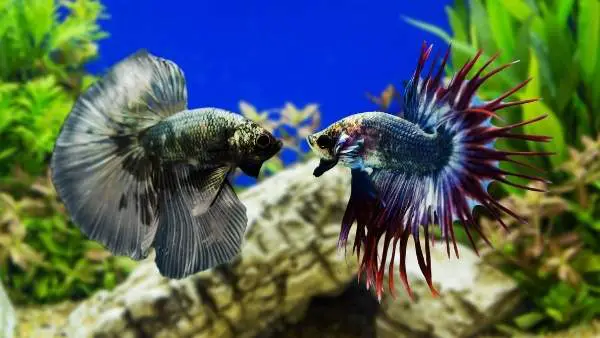Betta fish can live in cold water, however, they are tropical fish that require warm water temperatures, therefore, it is not a good idea to keep them in cold water for too long. Bettas typically require a water temperature range between 76 and 80°F (24 - 27°C), and if the temperature they are residing in is below this, then it is usually followed by health complications such as a weaker metabolism and immune system.

Many hobbyists, especially those who are not experienced with betta fish will often miss the signs and signals that their fish tank is too cold for them.
Obviously, your thermometer should tell you the accurate temperature of your aquarium, but sometimes it does not and your fish could be in trouble.
Sure, betta fish can survive in cold water, and they are extremely adaptable and hardy fish, mostly thanks to them being labyrinth fish, but there is a limit where unfortunately your betta will be too cold and die.
What Happens If My Betta Fish Gets Cold?
By having your betta fish residing in cold water, you are going to cause problems for this tropical fish. There are many things that can go wrong, so, let's take a look at them.
1. Diseases and Infections
If the temperature drops too low, your betta's immune system will suffer and will likely increase its vulnerability to catching deadly diseases, infections, and parasites.
The majority of betta fish will fall sick if their tank is unclean, especially if their immune system is already compromised due to cold water conditions.
Most diseases and infections can be treated if caught early enough, but if your tank remains unchanged, expect a short life for your bettas.
2. Lethargic and Inactive
Bettas do not show signs of sickness immediately, so, it may not be the first indication that your betta fish tank temperature is low. One of the first signs is their inactivity. Your betta will start moving around lethargically and not much at all if your aquarium water temperature is too low.
Betta fish are cold-blooded, which means that their response to cold temperatures is fewer movements.
They begin swimming slowly and sluggishly and will spend most of their time barely moving at all. If the cold temperatures do not stop, they will completely stop moving, residing typically at the bottom of the tank.
Being slow and lethargic can also be a sign of disease, however, you should always check the temperature first before you self-diagnose what you think the cause is.
3. Metabolism Will Rapidly Decrease
Cold temperatures will rapidly decrease the metabolism of your betta, causing your fish to become far less active. Not only this, but a slow metabolism will likely result in more diseases being picked up and health defects like constipation and swim bladder disease.
Due to their tropical nature, a betta fish's metabolism increases massively when they are in warm waters, which allows them to eat more betta food and acquire more energy, resulting in a far healthier fish.
How Cold is Too Cold For a Betta Fish?
Anything below 74°F (23°C) is too cold for betta fish to live a healthy and happy life. Ideally, you want your betta fish residing in temperatures ranging between 76 and 80°F (24 - 27°C).
Additionally, it is certainly worth mentioning that even if a betta fish enters a new tank where the temperature is correct for them, they can still suffer from temperature shock if you do not remember to acclimate the fish.

New betta fish may have been used to a different temperature in a different tank, including a different pH level, which is why it is abundantly important to make sure your new betta is acclimatized to their new home upon arrival. They can also take longer to adjust to the new tank temperature due to the stress of moving.
How Long Can Betta Fish Live In Cold Water For?
Surprisingly, if a betta fish is in water that is just a few degrees less than 76°F (24°C), it can survive for around 3-6 months! However, anything below 72°F (22°C), which is considered freezing for them, will, unfortunately, kill your betta within days.
Despite being able to survive for months in relatively cold waters, bettas will certainly not thank you for it. They will likely become sick and slow, putting on weight, and becoming much more susceptible to disease.
How To Increase Your Water Temperature
You can combat a cold tank by firstly installing a good heater for your aquarium, and slowly increasing the temperature over a few days. Again, you do not want any dramatic changes in their temperature, and this includes going from cold to warm.
In addition to the heater, you will need a good thermostat as you will need to constantly be monitoring the temperature of their tank in an accurate way.
Even if you do not have a heater, you can still increase the temperature of their water by placing a cover over their tank, helping the aquarium retain heat easier.
Sometimes this can result in gas exchange restrictions that will occur at the top of your tank, this can be fixed by adding a water stone, which will prevent oxygen deficiency within your tank.
You could also add more intense lighting to your tank to help heat the water up.
Aquarium lights are fantastic at generating heat, so much so that many hobbyists will keep their lights off for the entirety of summer as they do not want to overheat their tank.
If you want lights that just make your aquarium look that much cooler without affecting the water temperature, you could get an aquarium blue light. These come in a variety of colors too!
Another recommendation is having a good filtration system that will help keep your water fresh and not stale. Smaller tanks are much easier to warm up, so, if you own a large aquarium that you need time to heat up, it may be worth adding your betta fish to a smaller warm tank whilst you wait for the larger one to heat up.
What Is The Maximum Temperature For Betta Fish?
Just because betta fish do not like cold water, it doesn't mean you can put them in really high-temperature water either. 84 to 86°F (29 - 30°C) is the maximum temperature range a betta fish tank should be. Just because they can handle higher temperatures, it doesn't mean you should push the boundaries too much and create a heat stress issue.

Heat stress is a real thing that betta fish can suffer from, which will result in them having difficulty breathing. If the water temperature in your aquarium surpasses 86°F (30°C) over the course of several hours, remove them immediately to cooler water.
A strange but effective method for slowly reducing the temperature of a tank is to add ice cubes every few hours or so, to ensure a gradual decrease in temperature.
Conclusion
To conclude, it is always good to keep in mind that, if your tank temperature plummets to below 72°F (22°C), your betta will need some immediate help in the way of warming their tank up.
Alternatively, if your betta tank starts to become too hot, surpassing 86°F (30°C), then you need to cool your tank down slowly until it reaches the optimal temperature range for your betta fish.
A cold aquarium can lead to fatalities for your betta fish, which is why it is so important to not neglect the temperature decreases or increases that occur within your aquarium.

